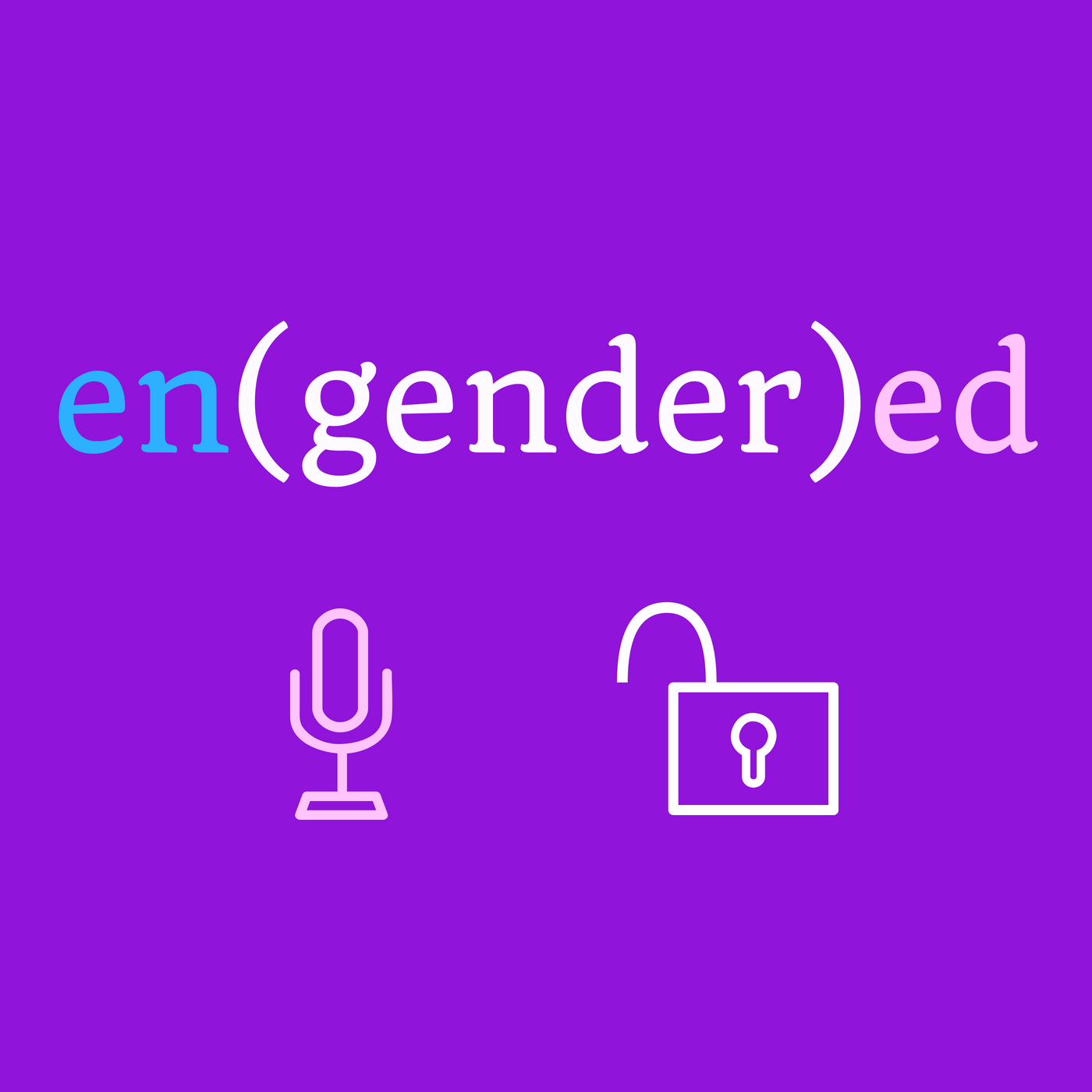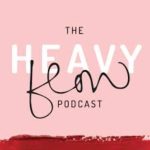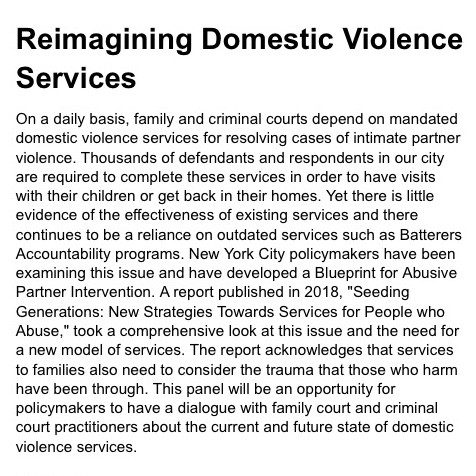
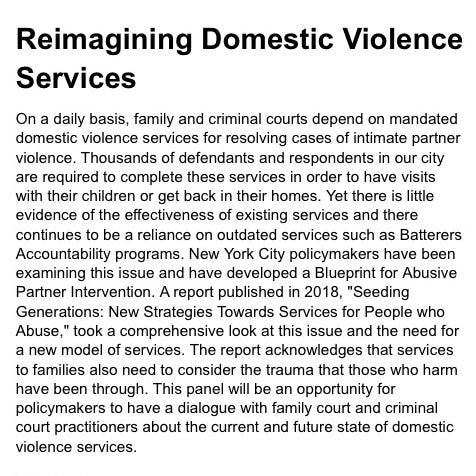
Imagine attending a #BlackLivesMatter organizing meeting and hearing the organizers spout #AllLivesMatter or #BlueLivesMatter as a rallying cry. Imagine going to a Title IX policy workshop that touted itself as a solution to strengthening accountability of campus rape and sexual assaults, then hearing the speakers refer to Brock Turner, not as a convicted rapist, but as the “Stanford swimmer who unintentionally engaged in outercourse.” Imagine turning on the television and hearing reporters refer to 2017’s Charlottesville protest, not as one organized by white supremacists to protest the removal of Confederate monuments, but as one by “people who suffer from implicit and/or explicit racial bias.” I bet it wouldn’t be hard to conclude that you were a guest character thrust into one of the alternate Earth’s in The Flash. That’s how I felt tonight.
A little background here. NYC formed the NYC Domestic Violence Task Force in 2016 — in response to the alarming and higher rates of homicide victims attributable to domestic violence and intimate partner violence. Women and women of color were disproportionately victims and men were disproportionately the perpetrators. The research to be presented was, in part, a response to these trends.
I was one of about eighty people (and one of two self-acknowledged survivors) crammed into a room in NYC Bar Association panel discussion titled “Reimagining Domestic Violence Services.” As the title and the above description states — New York City has come up with a “Blueprint for Abusive Partner Intervention” that “needs to consider the trauma that those who harm have been through.” In case you didn’t get that — they mean abusers.
As soon as the first of sixth speakers began, I found myself channeling Yoda, Buddha — whomever, in order to manage my increasing erratic heartbeat and physiological response to the trauma I was experiencing from being in a supposedly “safe” space with advocates providing interventions to survivors of domestic and intimate partner violence, while feeling deeply betrayed by their mask of allyship. Hell — at that moment, I even appreciated the calm, cool and collected stoicism (or indifference?) I’ve long criticized in Meredith Grey. I needed to listen and be calm so that I could critically respond to what might be the future of NYC domestic violence services.
You see, the speaker began his talk by expressing the need for those working in the system to move away from “stigmatizing” the “abuser” or the “offender” and use words to “humanize” the “person who does harm.” Then he asked us to imagine what it would be like if there were services for these people and stated that “transformation” needed to happen within communities, by addressing systems of oppression. The rationale behind all of this is that we don’t want to exacerbate the systemic racism and poverty that abusers of color have faced, by placing them into a chronically racist and broken criminal justice system. Let’s find “alternatives” to incarceration and not put more black and brown men in prison.
“What is it that [survivors] need to feel safe?” he asked, and then shared how survivors he knew were reticent from engaging with “systems” because safety looks different for different survivors. The speaker acknowledged that reparations, repair, and accountability were needed and, at the same time, that women of color were also interested in “sacrificing” their own safety to get the abuser help.
At some point during the panel, the following slides were displayed.
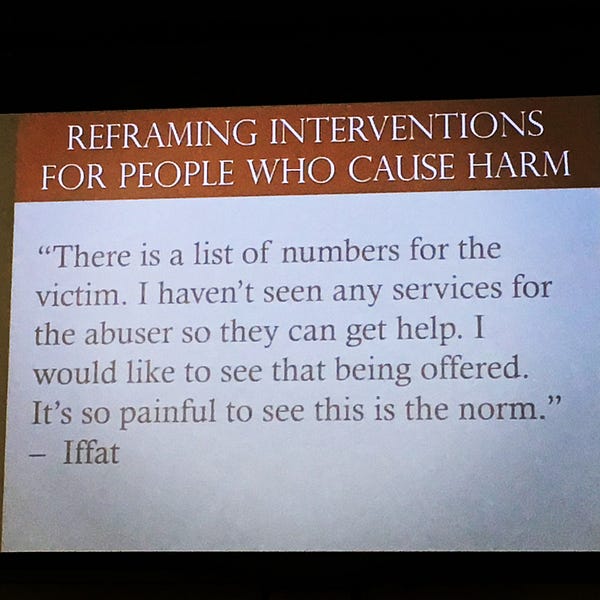
Notice here that the survivor uses the word “abuser,” but the panelist is reframing him as a “[person] who cause[s] harm” — perhaps to address the pain she feels for hoarding the resources in the city? (That’s actually far from true. Services exist, but are not holistic and don’t address the systemic sexism that begets the abuse to begin with).
What’s most alarming about this slide is the insinuation that “services” will help — as if, if we just got white supremacists “therapy,” that somehow they would stop thinking racist thoughts, engage in homophobic or transphobic acts of bullying, and suddenly become “transformed.”
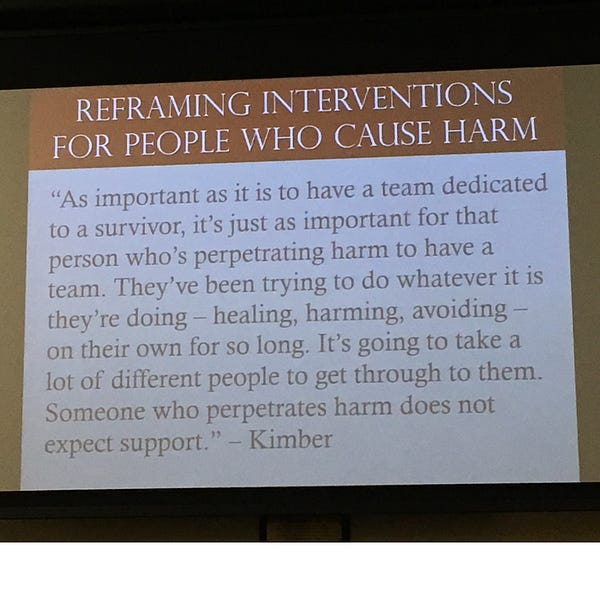
This slide uses language that subtlely victimizes the abuser —shifting the focus from survivor to perpetrator — characterizing him as bereft of empathy, commitment, or “support.” And we are to believe that the abuser is engaging in this metaphysical struggle — to heal, harm or avoid — and his failure can be remedied if only “more” was given to him.
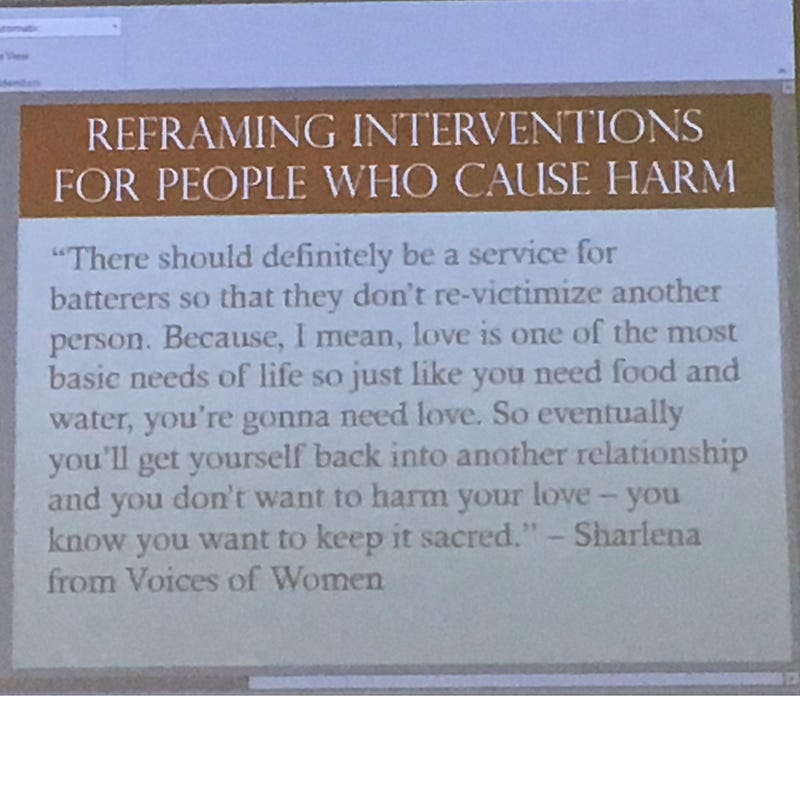
This last slide exposes the often thought, and perhaps not as often articulated sentiment, that survivors want their partner to change so that he may be available, one day, to give her “love.” To be clear, this survivor does say, so that he can “receive” love, and implies that by abusing, he might push away future victims. I hate to be cliche here, but as bell hooks says in All About Love:
“When we understand love as the will to nurture our own and another’s spiritual growth, it becomes clear that we cannot claim to love if we are hurtful and abusive. Love and abuse cannot coexist.”
By showing these slides, the panelists were effectively endorsing the slides’ validity as justifiable starting points for subsequent intellectual machinations. Words and phrases like “toxic masculinity,” “patriarchy,” “privilege” were dangled in front of us to seduce us into thinking we were safe. Yet, no one problematized or pointed out the internalized sexism and internalized misogyny that both survivor and slide selector must possess, in order to validate these statements as the basis for determining the spectrum of survivors’ “needs.” Fantasies are a more apt description.
Needs would and should include first and foremost, the need for liberation from a dynamic of power and control, where one partner is exercising domination, coercion, violence perhaps, and most likely, some sort of privilege. You can’t be safe unless you’re free, and leave with a decolonized mind and heart. Needs would also include the need to be free to choose to leave and to stay away — and to have the means to do so — financially, emotionally, physically, legally (e.g., with regards to issues of immigration status), and with respect to being able to protect the children. (Listen to Episode 9 of my podcast for how family courts view claims of abuse and child abuse to understand why this is so hard to do).
None of these choices exist currently for survivors, en masse. Instead, we are left to navigate the siloed structures and systems one by one, one need at a time, the way a bystander to a shooting might try and clamp down on a bullet wound to save a wounded victim, while half a dozen other bullet holes are gushing blood. You can’t. Only a team of people addressing all the wounds simultaneously might offer some chance of survival.
The evening was peppered with this pattern of fact-sharing, followed by inaccurate conclusions or inappropriate solutions that went unchallenged or unacknowledged. One panelist shared the survivor sentiment that if that survivor and her partner had access to more money, they could have had therapy, and he could have changed. I’m paraphrasing, but you get the point. Yeah, like if only Donald J. Trump had access to therapy, then he wouldn’t embody the sexist, racist, homophobic, on and on and on, epitome of why we must urgently dismantle our white, male, supremacist, capitalist patriarchy.
Audience members lamented that they only saw black and brown men going through the criminal justice system for domestic violence. “Where were the white men?” “Were black and brown men being arrested at higher rates?” Perhaps. But, it’s also likely that when you have more privilege as a white male — white privilege and class privilege — you rely less on violence as a form of control. White abusers and wealthier abusers are more likely to use coercive control, which is not a crime in the United States, and won’t put these abusers at risk of criminal justice system involvement.
The most important, subtle, and dangerous sentiment uttered, was the need by survivors to learn how to “co-parent” with their abusers. Notwithstanding the fact that abusers don’t believe in equality — hence it’s definition as an exercise of “power and control” — there are also well established legal precedents and evidence-based guidelines that “parallel parenting” is safest for survivors. If the premise is that the evening’s panel would be applying a “trauma-informed” lens to addressing policies in domestic violence prevention and intervention, why is that lens exclusively applied only to the abuser?
Have we forgotten the decades of research — especially Adverse Childhood Experiences — that chronicle the harm that witnessing abuse does to children? So now we are supposed to be okay with experimenting with the abuser staying in the picture and piloting of “family therapy” treatments where domestic violence agencies are treating the survivor, the child, and the “person who does harm?” And, all of this because we need to take into account that black and brown men are disproportionately committing violence against black and brown women? High enforcement and high accountability of domestic and intimate partner violence crimes will deter all offenders, not just those of color.
Haven’t we been here before — where we have weaponized race to subordinate, minimize, or ignore violence against women? Clarence Thomas comes to mind. OJ Simpson too. And because we didn’t learn anything from the Anita Hill hearings and teach our daughters about systemic and structural sexism, a generation of millenials have only recently become awakened to the concept of #rapeculture from the Brett Kavanaugh confirmation hearings. And just a few weeks ago — R. Kelly.
The panelists talk about the concept of “transformative justice” whereby the community participates in creating and defining systems and structures of accountability as they see fit, because the criminal justice system has failed us — yet they fail to provide the tools to the community to implement such accountability, including identifying and addressing their own sexist beliefs, behaviors, and mindsets. Instead of filling the many gaps in how we serve survivors and how we even define ‘safety” — which should include liberation from patriarchal oppression and freedom first — we are throwing the baby out with the bathwater.
What about addressing structural sexism that keeps women from achieving equal pay, affordable healthcare, affordable childcare, workplace harassment, eliminating the care penalty and the patriarchal money pit, and the physical impact that sexism has on our health and bodies, to name a few? If we don’t address the forces that limit women’s choices and autonomy and allow choosing “sacrifice” over safety even an option for survivors to consider, we are not centering survivor needs at all, but only paying lip service to doing so. Since Lifetime’s airing of the “Surviving R. Kelly” docuseries, the singer’s Chicago concert sold out, with women screaming, “Take Me Hostage.” So much for relying on the community to hold abusers accountable.
**If you’re a survivor and/or just interested in sharing your feedback about the above proposal, please send an email to .**
